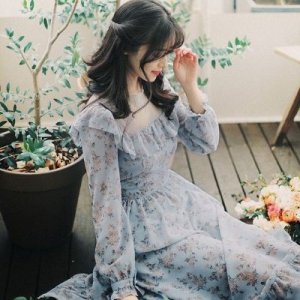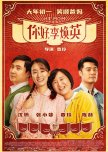A warm movie..beautiful..cute..moving emotions
Chinese comedian Jia Ling makes her directorial debut in Hi, Mom 《你好,李焕英》, bringing her humour into a heartfelt story about a mother-daughter relationship.
The script for Hi, Mom is based on Jia Ling’s comedy skit of the same name, which was, in turn, inspired by her own mother’s passing. Together with her co-writers, the script took more than three years to finish. Filming took place in Xiangyang, Hubei, the hometown of director Jia Ling. The film has been met with huge financial success. It has become the highest-grossing film of 2021, the second highest-grossing non-English film, and the highest-grossing film by a solo female director — not just in China, but of all time.
The film revolves around Jia Xiaoling (Jia Ling) and her mother Li Huanying (Zhang Xiaofei), whom the film endearingly dubs Ling and Ying respectively. After a motor accident leaves Ying hospitalised, Ling accidentally travels back in time to 1981 and meets a younger Ying who is working in an iron factory. Ling, feeling as though she has never made her mother proud in her life, decides to use this opportunity to redeem herself.
The dynamic between Ling and Ying is a very interesting one. It starts off as a mother-daughter relationship but evolves into a close friendship once Ling meets younger Ying. This duality helps surprise viewers with what Ying was like in her youth, while also showing how many of her beliefs have been rooted in her character since young and have remained unchanged through the years.
Ling believes that in order for her mother to be proud of her, she needs to achieve certain goals in life. She thinks these come in the form of her educational or financial success. When Ling realises she has travelled back in time, she uses what she knows from the future to make her mother’s life better. She pushes Ying into specific situations and motivates her to take on tasks that she was otherwise apprehensive about.
Along the way, Ying meets several other characters who help orchestrate her plans — a gangster turned good friend Leng Te (Chen He), and the iron factory manager’s son Shen Guanglin (Shen Teng). Both characters are very well-fleshed-out despite not being part of the main cast.
On the surface, Leng Te seems like your typical bad boy character but is revealed to have a heart of gold. He may be a little daft but he makes missteps out of foolishness rather than with ill intent. Leng Te’s relationship with his family is shown briefly and this moment gives us a glimpse of how every family struggles differently.
Shen Guanglin is trying to shake the stereotype tied to him that he is a spoilt kid whose privilege has made life easy for him. As he tries to woo Ying, he also takes the opportunity to prove himself. He grows into his own person independent of his father’s approval, and makes choices to prove it. The film also uses his character to discuss themes of class inequality and nepotism, which is very poignant against the setting of the working class.
The film uses humour in a variety of ways. Hi, Mom nails its punchlines when delivered, which is aided by the characters’ strong personalities and relationships. The film also utilises a lot of non-verbal cues to deliver its jokes, including visual comedy. The interactions between the characters are entertaining to watch and come across very naturally so that they do not feel forced.
Although Hi, Mom touts itself as “the all time #1 comedy in China” and can certainly land its jokes when it needs to, it does not shy away from serious themes and drawing out emotions either. In fact, I believe the movie’s main driving force is its heartfelt portrayal of motherly love and familial relationships. It is these touches of reality that help ground the film and remind viewers that its messages are not drawn from fiction.
The relationship between Ling and Ying creates several emotional moments that show us the ups and downs of families, while still warming our hearts with the love and care that the two characters share with each other to get through life. Ling shows immense growth in her understanding of her mother’s character over the course of the movie as well as her own perception of herself. This reveals Ying’s unbounding love for her daughter despite all that she sees of herself, and shows us the true meaning of a mother’s love.
In terms of the film’s technical aspects, colour is a very interesting metaphor in the film and it helps add a layer of depth that transcends words. The phrase “bringing colour to life” perhaps best describes the film’s approach here. When Ling is transported through time and falls into 1980s Hubei, the backdrop of a once black-and-white era comes to life with vibrancy and she knows that she is truly living in and experiencing the environment around her and not simply hallucinating from images she has seen before.
The use of colour also emphasises the idea of finding joy in things that are taken for granted, such as when Ling sees the happiness that early technology brings to Ying and her friends despite such technology being obsolete to her. She casts aside what she knows and basks in the moment that is shared among them.
Hi, Mom hits home several inspiring messages about family and love. I believe it teaches us to see our family beyond their material achievements and to put their happiness first. It also shows the importance of parental figures and highlights the sacrifices they make. Audiences online have described their renewed feelings to connect with their own family after seeing the film. It effectively tells a story that is both comedic and emotionally significant in its own way.
The script for Hi, Mom is based on Jia Ling’s comedy skit of the same name, which was, in turn, inspired by her own mother’s passing. Together with her co-writers, the script took more than three years to finish. Filming took place in Xiangyang, Hubei, the hometown of director Jia Ling. The film has been met with huge financial success. It has become the highest-grossing film of 2021, the second highest-grossing non-English film, and the highest-grossing film by a solo female director — not just in China, but of all time.
The film revolves around Jia Xiaoling (Jia Ling) and her mother Li Huanying (Zhang Xiaofei), whom the film endearingly dubs Ling and Ying respectively. After a motor accident leaves Ying hospitalised, Ling accidentally travels back in time to 1981 and meets a younger Ying who is working in an iron factory. Ling, feeling as though she has never made her mother proud in her life, decides to use this opportunity to redeem herself.
The dynamic between Ling and Ying is a very interesting one. It starts off as a mother-daughter relationship but evolves into a close friendship once Ling meets younger Ying. This duality helps surprise viewers with what Ying was like in her youth, while also showing how many of her beliefs have been rooted in her character since young and have remained unchanged through the years.
Ling believes that in order for her mother to be proud of her, she needs to achieve certain goals in life. She thinks these come in the form of her educational or financial success. When Ling realises she has travelled back in time, she uses what she knows from the future to make her mother’s life better. She pushes Ying into specific situations and motivates her to take on tasks that she was otherwise apprehensive about.
Along the way, Ying meets several other characters who help orchestrate her plans — a gangster turned good friend Leng Te (Chen He), and the iron factory manager’s son Shen Guanglin (Shen Teng). Both characters are very well-fleshed-out despite not being part of the main cast.
On the surface, Leng Te seems like your typical bad boy character but is revealed to have a heart of gold. He may be a little daft but he makes missteps out of foolishness rather than with ill intent. Leng Te’s relationship with his family is shown briefly and this moment gives us a glimpse of how every family struggles differently.
Shen Guanglin is trying to shake the stereotype tied to him that he is a spoilt kid whose privilege has made life easy for him. As he tries to woo Ying, he also takes the opportunity to prove himself. He grows into his own person independent of his father’s approval, and makes choices to prove it. The film also uses his character to discuss themes of class inequality and nepotism, which is very poignant against the setting of the working class.
The film uses humour in a variety of ways. Hi, Mom nails its punchlines when delivered, which is aided by the characters’ strong personalities and relationships. The film also utilises a lot of non-verbal cues to deliver its jokes, including visual comedy. The interactions between the characters are entertaining to watch and come across very naturally so that they do not feel forced.
Although Hi, Mom touts itself as “the all time #1 comedy in China” and can certainly land its jokes when it needs to, it does not shy away from serious themes and drawing out emotions either. In fact, I believe the movie’s main driving force is its heartfelt portrayal of motherly love and familial relationships. It is these touches of reality that help ground the film and remind viewers that its messages are not drawn from fiction.
The relationship between Ling and Ying creates several emotional moments that show us the ups and downs of families, while still warming our hearts with the love and care that the two characters share with each other to get through life. Ling shows immense growth in her understanding of her mother’s character over the course of the movie as well as her own perception of herself. This reveals Ying’s unbounding love for her daughter despite all that she sees of herself, and shows us the true meaning of a mother’s love.
In terms of the film’s technical aspects, colour is a very interesting metaphor in the film and it helps add a layer of depth that transcends words. The phrase “bringing colour to life” perhaps best describes the film’s approach here. When Ling is transported through time and falls into 1980s Hubei, the backdrop of a once black-and-white era comes to life with vibrancy and she knows that she is truly living in and experiencing the environment around her and not simply hallucinating from images she has seen before.
The use of colour also emphasises the idea of finding joy in things that are taken for granted, such as when Ling sees the happiness that early technology brings to Ying and her friends despite such technology being obsolete to her. She casts aside what she knows and basks in the moment that is shared among them.
Hi, Mom hits home several inspiring messages about family and love. I believe it teaches us to see our family beyond their material achievements and to put their happiness first. It also shows the importance of parental figures and highlights the sacrifices they make. Audiences online have described their renewed feelings to connect with their own family after seeing the film. It effectively tells a story that is both comedic and emotionally significant in its own way.
¿Te ha parecido útil esta reseña?























